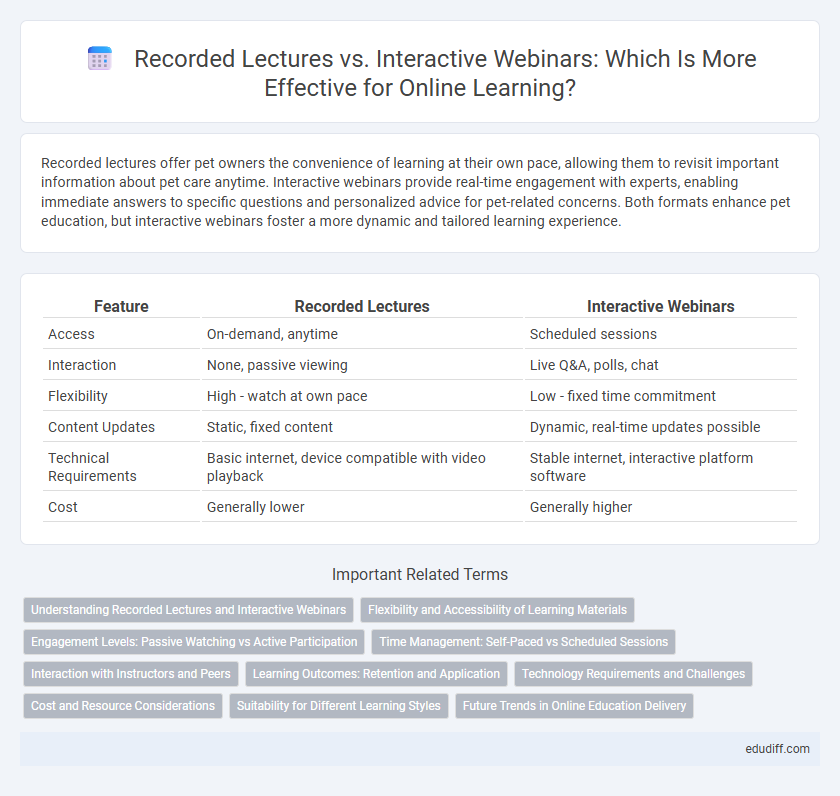Recorded lectures offer pet owners the convenience of learning at their own pace, allowing them to revisit important information about pet care anytime. Interactive webinars provide real-time engagement with experts, enabling immediate answers to specific questions and personalized advice for pet-related concerns. Both formats enhance pet education, but interactive webinars foster a more dynamic and tailored learning experience.
Table of Comparison
| Feature | Recorded Lectures | Interactive Webinars |
|---|---|---|
| Access | On-demand, anytime | Scheduled sessions |
| Interaction | None, passive viewing | Live Q&A, polls, chat |
| Flexibility | High - watch at own pace | Low - fixed time commitment |
| Content Updates | Static, fixed content | Dynamic, real-time updates possible |
| Technical Requirements | Basic internet, device compatible with video playback | Stable internet, interactive platform software |
| Cost | Generally lower | Generally higher |
Understanding Recorded Lectures and Interactive Webinars
Recorded lectures provide students with the flexibility to access content at their own pace, allowing repeated review of complex topics for better comprehension. Interactive webinars foster real-time engagement through live discussions, Q&A sessions, and collaborative activities that enhance understanding and retention. Combining recorded lectures with webinars delivers a comprehensive learning experience, balancing self-paced study with active participation.
Flexibility and Accessibility of Learning Materials
Recorded lectures offer unmatched flexibility, allowing learners to access content anytime and at their own pace, which enhances convenience for diverse schedules and time zones. Interactive webinars provide real-time engagement but often require strict scheduling, potentially limiting accessibility for global audiences. Both formats support digital learning, yet recorded lectures excel in providing on-demand access to educational materials for continuous review and self-directed study.
Engagement Levels: Passive Watching vs Active Participation
Recorded lectures offer convenience and flexibility but often result in passive watching, leading to lower engagement levels. Interactive webinars promote active participation through real-time Q&A, polls, and discussions, significantly enhancing learner involvement and retention. Studies show that engagement rates in webinars can increase by up to 50% compared to recorded sessions, making them more effective for dynamic learning experiences.
Time Management: Self-Paced vs Scheduled Sessions
Recorded lectures offer flexible time management by allowing learners to access content at their convenience, enabling efficient self-paced study tailored to individual schedules. Interactive webinars require attendance at scheduled sessions, promoting real-time engagement but demanding adherence to fixed times that may challenge busy professionals. Balancing recorded lectures' flexibility with webinars' structured timing supports diverse learning preferences and optimizes productivity.
Interaction with Instructors and Peers
Recorded lectures offer flexible, anytime access but limit real-time interaction with instructors and peers, reducing opportunities for immediate feedback and dynamic discussions. Interactive webinars facilitate direct engagement, enabling live questions, instant clarification, and collaborative learning experiences that enhance understanding. Peer interaction during webinars fosters networking and diverse perspectives, crucial for deeper comprehension and active participation.
Learning Outcomes: Retention and Application
Recorded lectures enable learners to review material at their own pace, enhancing retention through repetition and flexibility. Interactive webinars promote active engagement and immediate clarification, leading to better application of knowledge in real-world scenarios. Combining both formats maximizes learning outcomes by balancing comprehension with practical skill development.
Technology Requirements and Challenges
Recorded lectures demand minimal technology, requiring only a device capable of streaming video, which ensures broad accessibility and ease of use. Interactive webinars rely on stable high-speed internet, advanced software platforms, and real-time communication tools, increasing technological complexity and potential for connectivity issues. Challenges for webinars include managing latency, ensuring participant engagement, and technical support for both presenters and attendees.
Cost and Resource Considerations
Recorded lectures require lower upfront costs and minimal ongoing resources, making them a budget-friendly option for large audiences. Interactive webinars demand higher investment in technology, skilled moderators, and real-time engagement, increasing operational expenses. Organizations must balance cost efficiency with the desired level of participant interaction when choosing between recorded content and live webinars.
Suitability for Different Learning Styles
Recorded lectures offer flexibility and cater well to visual and auditory learners who benefit from replaying content at their own pace. Interactive webinars engage kinesthetic and social learners through real-time participation, discussions, and Q&A sessions that foster active involvement. Choosing between the two depends on individual preferences for self-directed review versus dynamic, collaborative environments.
Future Trends in Online Education Delivery
Recorded lectures offer asynchronous learning flexibility and scalability, making them ideal for self-paced education and global accessibility. Interactive webinars foster real-time engagement and personalized interaction, enhancing student participation and collaborative learning experiences. Future trends in online education will increasingly blend these formats using AI-driven analytics and adaptive technologies to optimize learner outcomes and engagement.
Recorded lectures vs Interactive webinars Infographic

 edudiff.com
edudiff.com